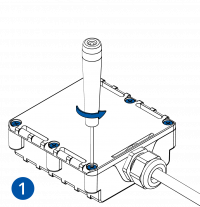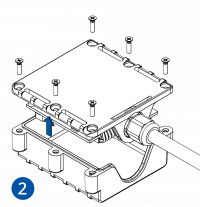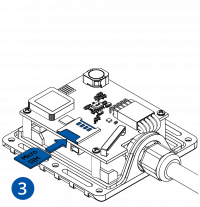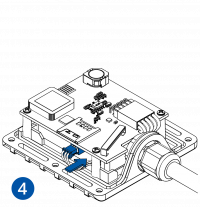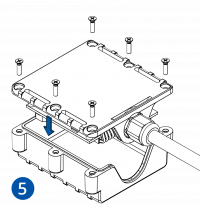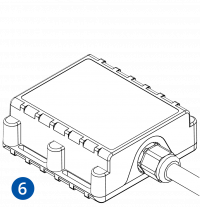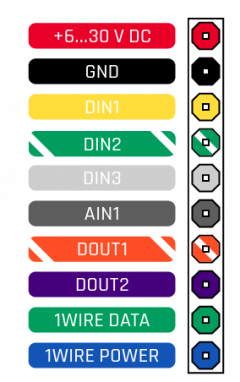FMA202 First Start: Difference between revisions
No edit summary |
No edit summary |
||
| Line 1: | Line 1: | ||
{{Template:FMA2_First_start_card|model= | {{Template:FMA2_First_start_card|model=FMA202|antenna=GNSS/GSM antennas|pic=[[Image:FMB202.png|600px|right]]}} | ||
{{Template:FMB2_First_start_config|model=FMB202|}} | {{Template:FMB2_First_start_config|model=FMB202|}} | ||
{{Template:FMB2_Mounting_recommendations|model=FMB202|}} | {{Template:FMB2_Mounting_recommendations|model=FMB202|}} | ||
Revision as of 12:56, 5 September 2018
Main Page > EOL Products > FMA202 > FMA202 First StartFMA202 Small and professional waterproof tracker with high gain internal GNSS/GSM antennas and high capacity internal Ni-MH battery
Quick Start Guide
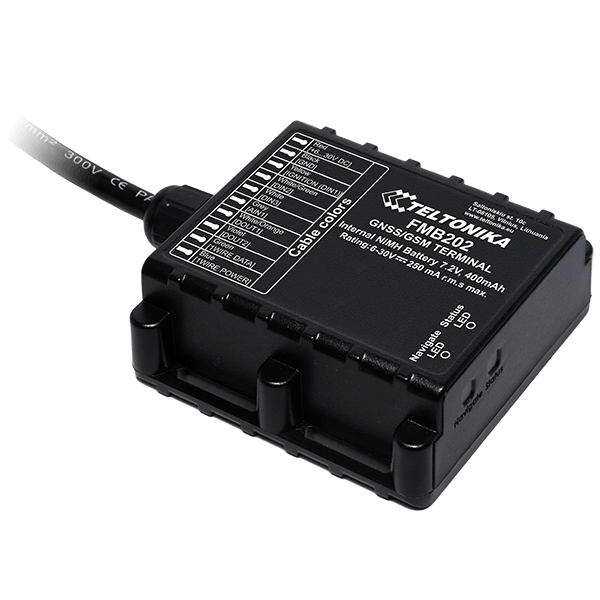
How to insert micro SIM card into FMA202
1. Open FMA202 case using screwdriver.
2. Remove FMA202 case.
3. Insert SIM card as shown.
4. Connect battery connector as shown.
5. Attach case, and screw in the screws.
6. Device is ready.
Cable colors
How to install FMB202 drivers (Windows)
1. Please download COM port drivers from here.
2. Extract and run TeltonikaCOMDriver.exe. This driver is used to detect FMB202 device when it is connected to the computer.
3. Click Next in driver installation window.
4. In the following window click Install button.
5. Setup will continue installing the driver and eventually the confirmation window will appear. Click Finish to complete the setup. You are now ready to use the device on your computer.
Configuration (Windows)
.NET requirements
| Operating system | MS .NET Framework version | Version | Links |
|---|---|---|---|
| Windows Vista Windows 7 Windows 8.1 Windows 10 |
MS .NET Framework 4.6.2 | 32 and 64 bit | https://www.microsoft.com/en-us/download/confirmation.aspx?id=53344 |
At first FMB202 device will have default factory settings set. These settings should be changed according to the user's needs.
Device can be configured to acquire and send data to server, in this case the GSM settings shall be set in regards with GSM operator's information. If device GSM is unavailable, the device will not be able to send the data and FMB202 will start storing records to flash memory. It is possible to store up to 192000 data records with 128 MB SD memory card (when 100 MB are used to store records). It will send data over GPRS when it is available. Note that FMB202 might reach its full memory capacity. If such case happens, the device will start deleting the oldest records in order to save new ones.
FMB202 configuration is performed via FMB202 Configurator program. Contact sales manager to get the latest FMB202 Configurator version or download from here. FMB202 configurator operates on Microsoft Windows OS and uses prerequisite MS .NET Framework.
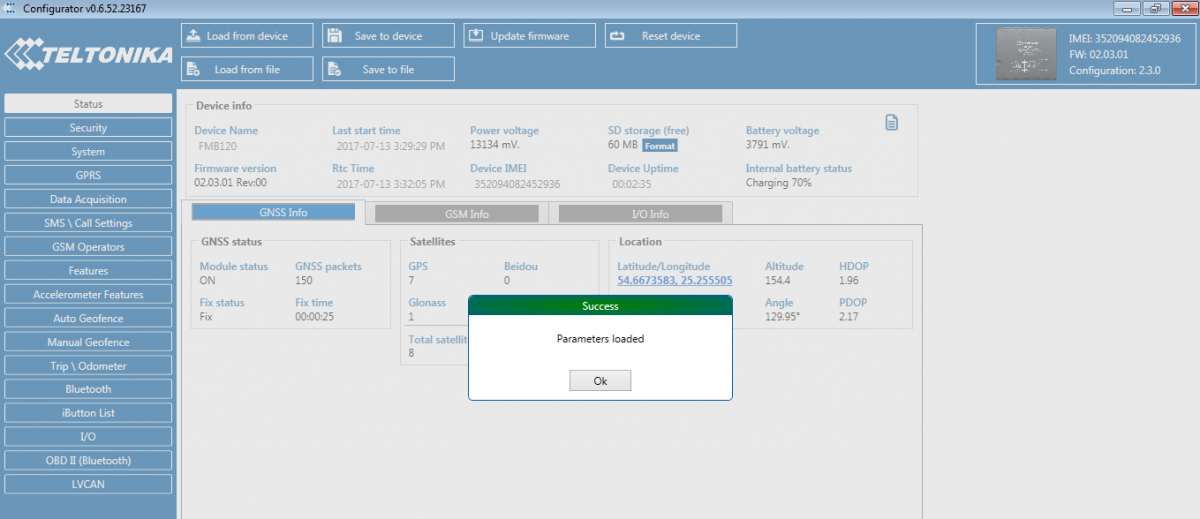
Module configuration can be performed over USB cable or using a Blue-tooth connection. Configuration process begins by starting FMB202 Configurator software and then connecting to FMB202 device via Connect button located in Online menu part. FMB202 has one user editable profile, which can be loaded and saved to the device. After any modification of configuration the changes need to be saved to FMB202 device using Save to device button.
Main buttons offer following functionality:
- Load from device – loads configuration from device.
- Save to device – saves configuration to device.
- Load from file – loads configuration from file.
- Save to file – saves configuration to file.
- Update firmware – updates firmware on device.
- Reset device – sets device configuration to default.
More details on using the Configurator can be found in the manual.
Mounting recommendations
- Connecting wires
- Wires should be connected while the module is not plugged in.
- Wires should be fastened to stable wires or other non-moving parts. Any heat emitting and/or moving objects should be kept away from the wires.
- There should be no exposed wires. If factory isolation was removed while connecting the wires, the isolation material should be applied.
- If the wires are placed in the exterior or in places where they can be damaged or exposed to heat, humidity, dirt, etc., additional isolation should be applied and the wires should not be loose.
- Wires cannot be connected to the board computers or control units.
- Connecting power source
- Be sure that after the car computer goes to sleep mode, power might be still available on the power wires. Depending on the car model, this may happen in 5 to 30 minutes period.
- When the module is connected, measure the voltage again to make sure it did not decrease.
- It is recommended to connect to the main power cable in the fuse box.
- 3 A, 125 V external fuse shall be used.
- Connecting ignition wire
- Be sure to check if it is a real ignition wire i. e. power does not disappear after starting the engine.
- Check if this is not an ACC wire (when key is in the first position, most of the vehicle electronics are available).
- Check if power is still available when you turn off any of vehicles devices.
- Ignition is connected to the ignition relay output. As alternative, any other relay, which has power output when ignition is on, may be chosen.
- Connecting ground wire
- Ground wire is connected to the vehicle frame or metal parts that are fixed to the frame.
- If the wire is fixed with the bolt, the loop must be connected to the end of the wire.
- For better contact scrub paint from the spot where loop is going to be connected.
 |
PAY ATTENTION! Connecting the power supply must be carried out in a very low impedance point of on-board vehicle network. These points in the car are the battery terminals. Therefore, we recommend connecting the power of FMB202 (GND and POWER wires) directly to the battery terminals. Another valid option is to connect the wires to the main POWER cable inside the fuse box (if there is none, then to the power supply where the fuses of vehicle’s computer are), GND wire must be connected in a special point, designed to connect GND vehicle computer. Connecting the GND at an arbitrary point to the mass of the car is unacceptable, as static and dynamic potentials on the line GND will be unpredictable, which can lead to unstable FMB202 operation and even its failure. |
Installation instructions
FMB202 is the device that has internal GNSS and GSM antenna.
Internal GNSS antenna device should be mounted with the sticker view to the open sky
(metal free) with not less than ¾ of metal free area as shown in figure below.
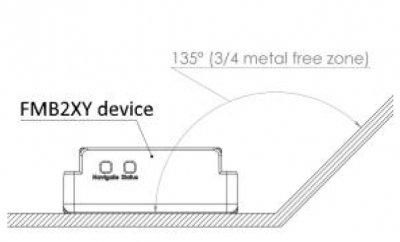
FMB202 has IP67 protection class. Top performance is reached if mounted outside of the
vehicle.
The device has 4 mounting holes on the edges, and can be tightened with screws, adhesive
tape or plastic straps.
FMB202 area with sticker and GNSS antenna is shown in figure below.
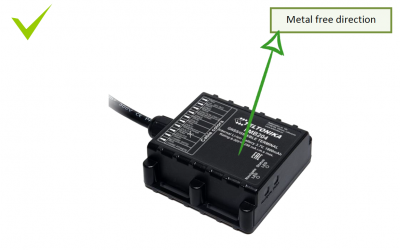
Safety information
This message contains information on how to operate FMB202 safely. By following these requirements and recommendations, you will avoid dangerous situations. You must read these instructions carefully and follow them strictly before operating the device!
The device uses SELV limited power source. The device uses a 6 V...30 V DC power supply.
The nominal voltage is 12 V DC. The allowed range of voltage is 6 V...30 V DC.
To avoid mechanical damage, it is advised to transport the device in an impact-proof package. Before usage, the device should be placed so that its LED indicators are visible. They show the status of device operation.
When installing the connection cables to the vehicle, the appropriate jumpers of the power supply of the vehicle should be disconnected.
Before dismounting the device from the vehicle, the connection cables must be disconnected.
The device is designed to be mounted in a zone of limited access, which is inaccessible to the operator. All related devices must meet the requirements of EN 60950-1 standard.
The device FMB202 is not designed as a navigational device for boats.

